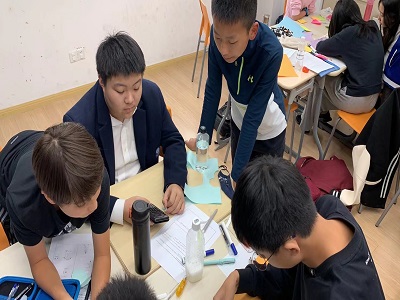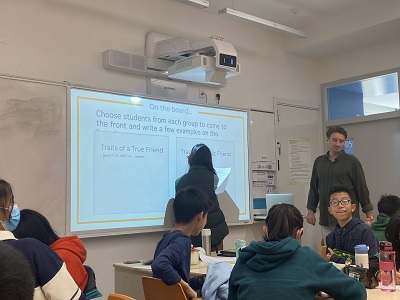-
ABOUT US
-
ACADEMICS
Curriculum Program
Departments
- English
- High School Chinese
- Primary and Junior School Chinese.
- High School Mathematics
- Middle School Mathematics
- Primary School Mathematics
- Music and Fine Arts
- Physical Education
- Physics
- Chemistry
- History and Geography
- Physical Science and Optional courses Department
- Middle School Biology
- High School Biology
- Social Sciences
- Computer Science
- Courses in Primary School
Achievements and Matriculations
College Counseling
Science & Technology Innovation Contest
Subject Competition
-
ARTS
-
ATHLETICS
-
AT SHSID
SHSID ∣ TIMES
PTSA
Club Exhibition
- 龙吟社
- Live 2 Drama
- Choir
- Hip-pop Dance Club
- The Primary School Dance Troupe
- Symposiums Club
- Biology Workshop
- You Shan
- VEX Robotic
- Peking Opera Club
- Baseball Club
- Model United Nations
- The World Scholar’s Cup
- Future Problem Solving Club
- United States Academic Pentathlon
- OM Club
- AMC Club
- Music for Patients
- SHSID Gazette
- Smile Charity
- Cultural Moments
- SciAcademy
- Stem Doge Alliance
- Chinese Debate Club
- IAA
- Mock Trial Club
- Zhengming Club
- Furry Friends
- GT-Racing
- Village Radio
- IMMC Club
- Creative Design and Intelligent Fabrication
- Future City Research Project
- ECOCAP
- AdvocaSEA
- SPDC
- Medishine
- Floorball Club
- Animusic MTC
- Wings Up
- All Booked
Health and Wellness
Campus Safety
Cafeteria Service
-
ADMINISTRATION
-
ADMISSIONS
-
ALUMNI
Alumni Information
Honors Students
- Class of 2025
- Class of 2024
- Class of 2023
- Class of 2022
- Class of 2021
- Class of 2020
- Class of 2019
- Class of 2018
- Class of 2017
- Class of 2016
- Class of 2015
- Class of 2014
- Class of 2013
- Class of 2012
- Class of 2011
- Class of 2010
- Class of 2009
- Class of 2008
- Class of 2007
- Class of 2006
Who Studied at SHSID
SHS Foundation
-
DOCUMENTS
Grade 7 YD: Dealing with Toxic Friendships & How to be a Better Friend
For this particular topic in YD, students were able to exercise their leadership and proximity skills. Friendship plays an important role in everyday life, but it can be difficult to deal with, especially when a friendship ends or does not work out the way it was expected to. A great factor impeding a successful friendship is toxic friendships. So how exactly do we identify and deal with toxic friendships appropriately? With the help from an educational video by Psych2go, the abundance of ideas was narrowed down to four main differences.
The first one is that a good friend will protect, often despite being outnumbered or at a disadvantage. They are always there to shield a friend from anything causing them discomfort. On the other hand, a toxic friend may opt out in these situations, switching sides to suit the majority. In some cases, they might not even show signs of empathy, taking little to no interest in their friend’s struggles.
The next difference is about trustworthiness. Supportive friends react suitably to confidential information. Having doubt in confiding information to someone suggests that they aren’t necessarily trustworthy to you. When the situation gets worse, toxic friends could use the information for their personal entertainment through means of gossiping or judging. Such actions are giant red flags for regular classmates, let alone someone considered a friend.
Third is how responsible and mature they are when regarding friends. Good friends are able to switch between making humorous jokes and having a serious conversation. They genuinely show interest with what their friends have to offer in companionship, versus remaining bored and indifferent. Toxic friends often dominate the conversation towards areas they prefer to talk about, disregarding a friend’s intolerance. They show little care and appreciation towards a friend’s presence.
Last, but not least, is keeping promises. People that consciously make sure that they are living up to their word are not only people with great virtues. They are also one of the best candidates for a friend. Their words actually are backed up with action, providing the needed comfort for those that are in tough situations. Dissimilarly, a toxic friend might provide the same amount of comforting words but lack the enthusiasm to fulfill their promises. These are empty promises. Upon confrontation, they might find unreasonable excuses or shrug it off. Even worse, shift the blame onto you, ending the conversation with a guilt trap.
Ultimately, look out for these signs in those around you. Of course, a toxic friend may not always be a bad person. The lack of chemistry between the two could also be the result of a tough time, or difference in personality. Try to talk it through and take a break from each other. There are many ways to end a friendship or take a break from it, but no doubt it will be painful. Always keep in mind that it is better to ebb away an issue before it manifests into something worse.


Written by Camille 7 (9)
Supervised by Fergal Lochhead
Pictures by Grade 7 teachers
Edited by Serene Yang, Niall Keenan